

Synchronize. Windows research. Complex Systems. iOS research. Gadgets. New Gadgetry. Hangouts. A new way to say hello. In today's mobile world, fast and reliable connectivity is almost second nature.
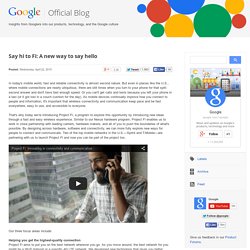
But even in places like the U.S., where mobile connections are nearly ubiquitous, there are still times when you turn to your phone for that split-second answer and don't have fast enough speed. Or you can't get calls and texts because you left your phone in a taxi (or it got lost in a couch cushion for the day). My Letter to Starbucks Mobile.
Dear Starbucks, We’ve been close friends for years.

I see you almost every day, some days more than once. I’ve visited you in over half a dozen countries, and there are probably half a dozen locations in Silicon Valley where you know me and my drink by name. I’ll be there for you when you need me, and I know you’ll be there for me when I need you. My girlfriend at the Starbucks in Harvard Square (2000) That’s why we need to talk. Starbucks Mobile is a Homescreen App I use your mobile app every day. It’s on the homescreen of my iPhone 5. How Anybody Can Secretly Save Your Snapchat Videos Forever. The New High-Security Sexting App For Discerning Teens. International Telecommunication Union. Monument in Bern, Switzerland.
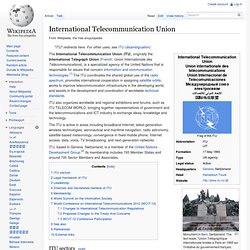
The text reads: "Union Télégraphique Internationale fondée à Paris en 1865 sur l'initiative du gouvernement français. Érigé par décision de l'Union Télégraphique prise à la conférence internationale de Lisbonne en 1908. " (In English: "International Telegraph Union founded at Paris in 1865 on the initiative of the French government. [This monument] erected by a decision of the Telegraph Union made at the international conference at Lisbon in 1908. ") ITU also organizes worldwide and regional exhibitions and forums, such as ITU TELECOM WORLD, bringing together representatives of government and the telecommunications and ICT industry to exchange ideas, knowledge and technology.
ITU, based in Geneva, Switzerland, is a member of the United Nations Development Group.[2] Its membership includes 193 Member States and around 700 Sector Members and Associates. ITU sectors[edit] Apple killing developer access to UDID in iOS 5. As noted by TechCrunch, Apple has alerted developers in recent documentation that it is in the process of deprecating access to the uniqueidentifier alphanumeric string that is unique to each iOS device.
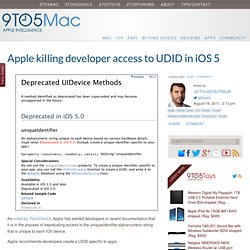
Apple Sneaks A Big Change Into iOS 5: Phasing Out Developer Access To The UDID. Apple is making a lot of big changes to its mobile operating system with iOS 5, which is dribbling out in betas for developers ahead of a general release later this year.

But there is one big change some developers are just starting to take notice of that Apple isn’t talking about that much. In a recent update to the documentation for iOS 5 (which is only available to registered Apple developers, but a copy was forwarded to me), Apple notes that it will be phasing out access to the unique device identifier, or UDID, on iOS devices such as iPhones and iPads.
This is a big deal, especially for any mobile ad networks, game networks or any app which relies on the UDID to identify users. Many apps and mobile ad networks, for instance, uses the UDID or a hashed version to keep track of who their users are and what actions they have taken. Here is the language from the Apple Developer documentation:
Apple Reportedly Stepping up UDID Deprecation. 17 February '12, 03:57pm. Amid Privacy Concerns, Apple Has Started Rejecting Apps That Access UDIDs. Amid extra scrutiny from Congress around privacy issues, Apple this week has started rejecting apps that access UDIDs, or identification numbers that are unique to every iPhone and iPad.
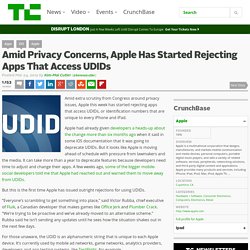
Apple had already given developers a heads-up about the change more than six months ago when it said in some iOS documentation that it was going to deprecate UDIDs. But it looks like Apple is moving ahead of schedule with pressure from lawmakers and the media. Apple Begins Rejecting Apps for Using the Unique Device Identifier (UDID) Apple Starts Rejecting Apps That Use UDID Codes to Track Your Engagement. Did you know that your iPhone or Pad comes with a unique identification number?

No? How about this, then: The 40-character-long unique identification number, the UDID, singles out your device from any other device Apple's created. Better still, it can be accessed by apps, app developers, and mobile ad networks without any permission needed on your part. Get your attention yet? Good, because you won't have worry much about the effects of your device's UDID going forward. The move shouldn't come as a great surprise to the legions of Apple app developers.
So, what's the point of the UDID anyway? Amid UDID Uncertainty, AppRedeem Creates New ID Scheme, Groupon Adopts. Six months ago, Apple began making some big changes to its operating system ahead of the release of iOS5.

Among them, was the news that it would begin ramping up the deprecation of the UDID — Apple’s go-to identifier that ties users to their specific iOS device. The company remained silent for months, but, as Kim-Mai reported last week, Apple recently began to take action, and is now rejecting apps that attempt to access those identifiers. Naturally, this has the iOS developer community sounding the alarm bells. Even though Apple made its intentions known months ago, since then, there’s been no consensus among developers as to the best replacement.
Some have perhaps expected Apple to propose a solution, but the company has remained silent. Apps that access UDIDs are still making it into the App Store, but developers now have to disclose the fact that they’re using them, and ask users for permission. So, the team created ODID as a way to address user privacy issues. Advertisers Unite to Work Around Apple's Device ID Policy. Apple's decision to deprecate the Unique Device ID (UDID) for iOS devices has sent the mobile advertising and analytics industry into panic mode.
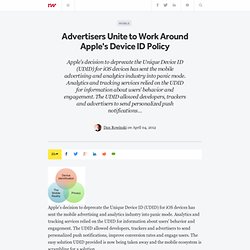
Analytics and tracking services relied on the UDID for information about users' behavior and engagement. The UDID allowed developers, trackers and advertisers to send personalized push notifications, improve conversion rates and engage users. The easy solution UDID provided is now being taken away and the mobile ecosystem is scrambling for a solution. The Days After: What’s Next After UDID? The growth and maturation of mobile advertising depends in part on the continued ability of publishers, developers and advertisers to identify devices in the mobile app environment.

Hence the mountain of blog posts on the topic once it appeared that Apple was actually rejecting apps using Apple’s UDID for this purpose. Dependency on UDID relates to how device identification enables relevant ads to consumers, analytics, frequency capping, conversion tracking, and/or app authentication; with Apple’s decision, the industry needs to develop effective and enduring solutions to ensure advertiser campaign success and the resulting publisher monetization needed to fuel the continued growth of mobile advertising. Recognizing the import of UDID in the ecosystem, Apple’s decision to reject UDIDs can appear at first glance to be a setback to the industry. Indeed, it feels like jumping into cold water—planned and fretted—but when you splash down, the water is still dang cold. Ios - An alternative to the device UDID - preparing ourselves. Xtreme Labs Inc. – How Apple’s UDID Deprecation Affects You. Last August, the iOS developer community discovered a small change with potentially large implications that came with the introduction of iOS 5.0: the deprecation of the UDID.
The UDID is a highly used unique identifier for each iOS device; somewhat like a social security number for your phone or tablet. UDIDs are widely used in the context of creating and distributing ad-hoc, beta builds. However, there have been a number of security and privacy concerns raised when it was found that this identifier was being used for many other purposes. Mobile Ideas. Next Web. Web World Things. NeWeb Teams. Internetworking.